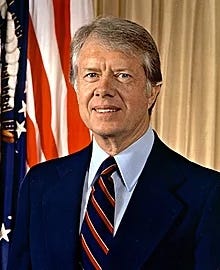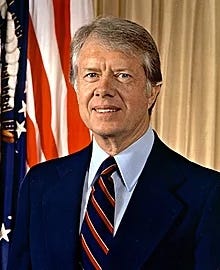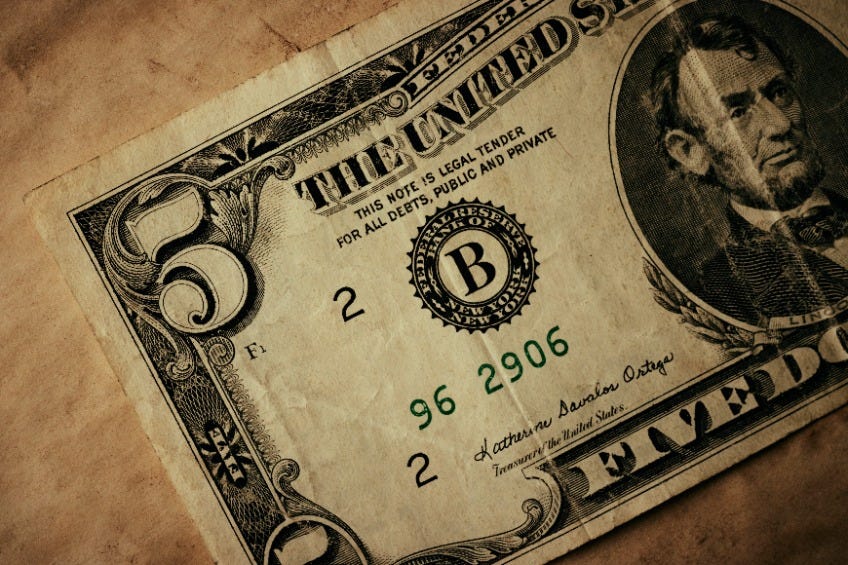All About Jimmy Carter, 39th U.S. President
He is the oldest living former president who also gracefully lost his reelection
Official 1976 Presidential Portrait for Jimmy Carter
Issue # 239 American History January 31, 2023
While the 45th president is still pushing the "Big Lie" that he won the 2020 presidential election by a margin of over 7 million popular votes and 74 Electoral College votes, he is also the only president who lost re-election and did not concede gracefully and assist with the "peaceful transfer of power."
A total of ten presidents lost their reelection campaigns, starting with John Adams, who accepted his defeat and left town without attending Thomas Jefferson's inauguration. Adams set the precedent for a peaceful transition of power by not contesting his loss.
In 1992, George H.W. Bush was very upset about losing to Bill Clinton. After all, he was a son of Prescott Bush! But Bush 41 conceded gracefully by saying "The people have spoken..." set up and assisted the transition team, and wrote a beautiful letter to the new President Clinton.
In 1980, first-term president James Earl Carter lost his reelection bid to Ronald Reagan, and what was even more hurtful, the American hostages who had been held in Iran for 444 days, went released about 20 minutes after Reagan took his oath of office.
At 98 years old, Jimmy Carter is the oldest living president and the only living president who lost his reelection bid.
Jimmy Carter was born in 1924 in Plains, Georgia, and grew up in the family peanut-farming business, learning hard work and a strong moral code from his parents. Jimmy was an exemplary student and attended Georgia Southwestern College and Georgia Tech before eventually enlisting in the Navy during World War II.
He served as an officer for five years aboard submarines before returning to Plains, Georgia for civilian life. Jimmy finished his college degree by attending the U.S. Naval Academy, eventually graduating with highest honors in 1946.
After his service, he returned to Plains and began running the family business while also getting involved in local politics and community initiatives.
The article continues below.
No intrusive ads or annoying popups ever! Instead, please see the important information below and at the bottom of this post. That’s how we grow and sustain this publication. AND, please keep those “Likes” and comments coming! Thanks!
There is new lower pricing for the paid levels at as little as $5.00/month or $50/year!
Paid subscribers with the Substack app are invited to participate in the W.A.S. Chat Room to discuss today’s post.
All posts are free for seven days after their publication. To read all older posts, including the complete archive, and to support us financially, please consider upgrading your subscription to a paid level. Save 17% with an annual subscription. Thank you for your support!
The article continues…
Jimmy and Rosalind Carter have been married for 76 years.
They were childhood friends who reconnected after Jimmy’s return home from the Navy. They were married in 1946, just a few weeks after Jimmy graduated from the Naval Academy. The Carters settled in Plains and had four children together—Jack, Chip, Jeff, and Amy. Jimmy continued to manage the family peanut business while also getting involved in local politics – first as a county commissioner and then as a state senator.
Jimmy Carter decided to run for president in 1976, inspired by the values of justice and equal opportunity he had grown up with. He saw how everyday Americans were being neglected and mistreated by the government, and wanted to create a better society for all people—including those who had been overlooked for centuries.
He also saw a need for positive moral leadership and an opportunity to bring together an increasingly divided nation. He ran on a platform of respect for civil rights, government reform, economic stability, and energy independence – which resonated strongly with the public.
Jimmy was the first presidential candidate from the Deep South since Reconstruction, and his grassroots campaign appealed to many who thought they weren't being heard or represented in politics.
Highlights and lowlights of the Carter presidency
On his second day in office, Carter pardoned all Vietnam War draft evaders by issuing Proclamation 4483.
President Carter established two new cabinet-level departments, the Department of Energy and the Department of Education. He also created a national energy policy that included conservation, price control, and new technology.
Carter pursued the Camp David Accords, the Panama Canal Treaties, and the second round of Strategic Arms Limitation Talks (SALT II).
On the economic front, he confronted stagflation, a persistent combination of high inflation, high unemployment, and slow growth. The end of his presidency was marked by the 1979–1981 Iran hostage crisis, the 1979 energy crisis, the Three Mile Island nuclear accident, the Nicaraguan Revolution, and the Soviet invasion of Afghanistan.
In response to the invasion, President Carter escalated the Cold War when he ended détente, imposed a grain embargo against the Soviets, enunciated the Carter Doctrine, and led a 1980 Summer Olympics boycott in Moscow. He is the only president to have served a full term in office and not have appointed a justice to the Supreme Court.
Jimmy Carter post-presidency
Shortly after losing his re-election bid, President Carter told the White House press corps of his intent to emulate the retirement of Harry S. Truman and not use his subsequent public life to enrich himself.
Even after leaving office in 1981, he continued to make meaningful contributions worldwide, including on issues such as human rights abuses and nuclear proliferation prevention through The Carter Center, established in 1982 and aimed at promoting and expanding human rights.
In 2002, he was awarded the Nobel Peace Prize for his work in co-founding the Center. He has traveled extensively to conduct peace negotiations, monitor elections, and advance disease prevention and eradication in developing nations.
Carter is considered a key figure in the nonprofit organization Habitat for Humanity. He has written over 30 books, ranging from political memoirs to poetry, while continuing to actively comment on ongoing American and global affairs, including the Israeli–Palestinian conflict.
Carter has been nominated nine times for the Grammy Award for Best Spoken Word Album for audio recordings of his books and has won three times.
Today President Carter is still remembered fondly around the world not only for his leadership skills but also for his kindness and humility.
Do you have memories of President Carter? Let us know in the comments or start a dialogue in the chat (for paid subscribers).
Help us to grow our We Are Speaking Substack!
Don’t Forget! If you have the W.A.S. app for iOS and Android, you can listen to each article by clicking the little headset icon. You can also participate in the W.A.S. Chat (for paid subscribers only).
There are many benefits to using the W.A.S. app, including the ability to listen to our posts and podcast episodes straight from the iOS or Android app.
Have you thought about starting a Substack publication of your own? It’s quick, easy, and free!
You can always leave any questions in the comments or email us.
Free posts are available for 7 days after publication. Adjust or upgrade your subscription to the paid level here. Pay less than 14¢ per post for the 36 monthly articles and podcast episodes. Thank you for your financial support!
Read Detroit Stories Quarterly by Keith Owens, et al.
Check out the Global Creative Community Branding and Marketing Academy (GCC BMA) offering online courses networking opportunities, and one-on-one and group coaching for independent writers and creative and solo professionals.








